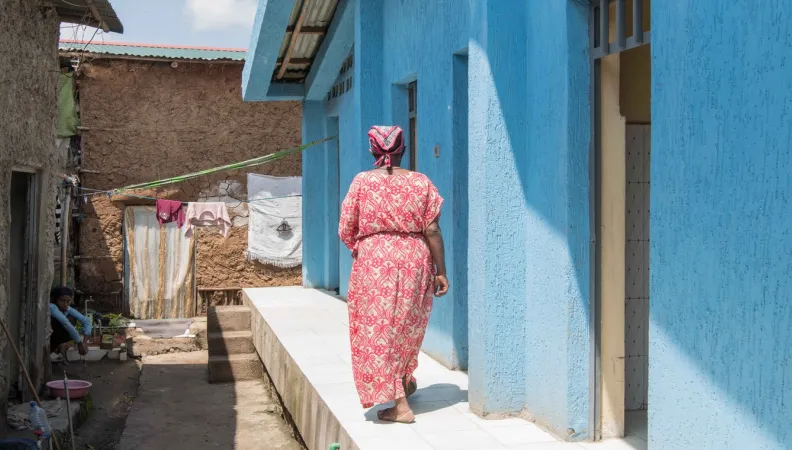Share the page
Improving Access to Water and Sanitation for millions in Ethiopia
Published on

World Toilet Day on November 19 highlights the dangers of lacking sanitary facilities, and the search for sustainable solutions. With an estimated 419 million people practising "open defecation" worldwide, the need for access to clean, safe toilets for all is more urgent than ever. Which is why AFD is funding a number of initiatives, including two flagship projects in Ethiopia. One will provide 2.6 million people with improved, gender-sensitive sanitation facilities and the second will improve access to water for 1 million people in 45 towns.
Originally published in November 2022, this article was updated on 17 November, 2023.
In the mountains of southern Ethiopia, 2,000 meters above sea level, the town of Sodo is a bustling hub. There is a whole series of small trade stalls, next to packed cafés. Yet until recently, most of the 200,000 inhabitants of this secondary town had no access to drinking water.
Ethiopia is the second most populous country in Sub-Saharan Africa, but it has the lowest figure in the region for drinking-water access (52%) and is one of 45 countries in the world where less than 50% of the population have access to sanitation.
That’s why AFD is funding two projects that align with the government’s priorities: one to provide greater access to water in five small and medium-sized Ethiopian towns (including Sodo); the other to improve access to water and sanitation in 22 secondary towns, co-financed with the World Bank.
See also: Boosting Access to Renewable Energy Across East Africa
Water = Equality
Sixty-year old Balaynesh Bergene smiles as she tells us how much her daily life has changed since having drinking water connected: “Before, we had to walk four or five kilometers every day to collect drinking water from the nearest source,” she says. “It would take us an hour to get there and an hour to walk back. And generally it’s us women who do the fetching!”
This constraint weighs heavily on women, both in Sodo and elsewhere in the world. “Things are much simpler now we’ve had the connection installed. We have access to water all the time, we get far less tired and the water is also much cleaner.” This water access is now enjoyed by eight families, each with around six members.
See also: Tunisia: Facilitating Access to Water and Women’s Empowerment
More practical, less costly
“We didn’t have access to water all the time. Sometimes the supply would be cut off for days, and we had to source water from private vendors,” says Debretu Wagauehu, a mother and café manager who has saved money since the water faucets were installed on her premises.
“However, a jerry can of water costs a lot more. We need water for everything: cooking, making coffee, water to drink... We’re so relieved that we can access it now!”
Wider impacts
Beyond the benefits of providing access to water, installing the connections has also created many jobs all along the production chain, at a time when 19% of young people are unemployed.
It is with great pride that 30-year-old Tegegn Ashenafin demonstrates water quality testing for us. Levels of chlorine, pH, turbidity – everything is covered. “I always wanted to work in industry”, he tells us. “So I studied industrial chemistry, and I’ve been working as a laboratory technician for three years. I’m proud to be doing this job, and working to serve the community!”
Access to sanitation: dignity regained
In parallel to providing access to water, an AFD-funded project also aims to improve sanitation in 22 secondary towns in Ethiopia, including Sodo. This has involved installing latrines, some public (accessible to anyone for a fee of 5 birr or 9 euro cents), and others communal, managed directly by the users. Some of the communal latrines were built in a poor neighborhood in the town of Hawassa.
For 65-year-old Tamerat Asfaw, these toilets have changed everything: “Before, there was just one area for us do our business, and it was extremely dirty and didn’t close; we were out in the open washing ourselves.
“This new space has given us our dignity back, and that’s really important to us.” He’s also delighted that the community manages the toilets: “We take it in turns to clean and maintain them ourselves. So we’re independent!”
